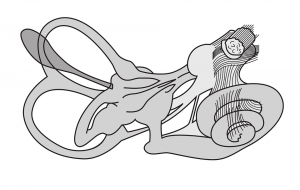Vertigo is like dizziness, except that it is more extreme and gives the sensation of the room spinning around you. If you are experiencing vertigo, please see your doctor as vertigo can have different causes. A common type of vertigo is benign paroxysmal positional vertigo (BPPV) which happens when a person turns his/her head quickly, or turns over in bed, after which it takes a little time for the spinning to stop. Vertigo can not only be a frightening sensation, it can also cause nausea and vomiting. The sensation of vertigo actually comes from the inner ear.
One of my patients who experiences bouts of vertigo found Dr. Carol Foster’s video. Dr. Foster is the Director of the Balance Laboratory at the University of Colorado Hospital in the Department of Otolaryngology.1

To quote Dr. Foster, “We have the cochlea – the hearing part of the ear, and then we have the semi-circular canals – the spinning sensors. What happens is: the particles that are in the utricle can sometimes get into this opening [see video below]. Then when you lie down in bed at night, the particles can just fall in by gravity. … When the particles build up to a big enough lump that they form a piston in the canal, when you move your head, the particles move a sensor (in the inner ear) and you feel that as spinning.”2
After experiencing vertigo herself, Dr. Foster invented an easy maneuver that knocks the particles loose which helps to alleviate the vertigo. If possible, have someone there to steady you as the maneuver itself will cause you to have some vertigo while you’re performing it.
For more information, watch Dr. Carol Foster’s highly informative video here:
Once again, please bear in mind that vertigo can have different causes; among them: benign paroxysmal positional vertigo (BPPV) – as discussed above, Ménière’s disease (accompanied by tinnitus and hearing loss), migraine-associated vertigo, ototoxicity (side effect from a drug), multiple vestibular disorders,3 diabetes, heart disease, atherosclerosis, and neurologic disorders.4 It is therefore very important you see your physician if you are experiencing vertigo or dizziness.


